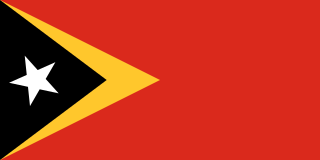
East Timor is a country in Southeast Asia, officially known as Democratic Republic of Timor-Leste. The country comprises the eastern half of the island of Timor and the nearby islands of Atauro and Jaco. The first inhabitants are thought to be descendant of Australoid and Melanesian peoples. The Portuguese began to trade with Timor by the early 16th century and colonised it throughout the mid-century. Skirmishing with the Dutch in the region eventually resulted in an 1859 treaty for which Portugal ceded the western half of the island. Imperial Japan occupied East Timor during World War II, but Portugal resumed colonial authority after the Japanese surrender.

The 2006 East Timorese crisis began as a conflict between elements of the military of East Timor over discrimination within the military, and expanded to a coup attempt and general violence throughout the country, centred in the capital Dili. The crisis prompted a military intervention by several other countries and led to the resignation of the Prime Minister Mari Alkatiri.

Kirsty Sword Gusmão AO is an Australian-East Timorese activist who served as the First Lady of East Timor from 2002 until 2007. She is married to Xanana Gusmão, former Prime Minister and President of East Timor. She is the founding director of the Alola Foundation, which seeks to improve the lives of women in Timor-Leste, a nation with one of the world's lowest per capita GDPs.

Falintil originally began as the military wing of the political party FRETILIN of East Timor. It was established on 20 August 1975 in response to FRETILIN’s political conflict with the Timorese Democratic Union (UDT).

Presidential elections were held in East Timor in 2007. The first round on 9 April 2007 saw six of the eight candidates eliminated. The remaining two candidates, incumbent Prime Minister José Ramos-Horta and FRETILIN President Francisco Guterres, faced each other in a runoff election on 9 May 2007. Ramos-Horta won the second round with 69% of the vote.

José Maria VasconcelosGColIH, popularly known by his nom de guerreTaur Matan Ruak is an East Timorese politician who has served as the Prime Minister of East Timor since 22 June 2018. He was also President of East Timor from 20 May 2012 to 20 May 2017. Before entering politics, he was the Commander of the FALINTIL-Forças de Defesa de Timor-Leste (F-FDTL), the military of East Timor, from 2002 until 6 October 2011. Prior to serving in the F-FDTL, he was the last commander of the Armed Forces of National Liberation of East Timor or FALINTIL, the insurgent army which resisted the Indonesian occupation of the territory from 1975 to 1999.

A parliamentary election was held in East Timor on 30 June 2007. Although a narrow plurality was achieved by the Revolutionary Front for an Independent East Timor (FRETILIN), a coalition involving the next three largest groups formed a government. New Prime Minister Xanana Gusmão of the National Congress for Timorese Reconstruction (CNRT) was sworn in on 8 August 2007; Fernando de Araújo of the Democratic Party became President of the National Parliament.

The National Council of Maubere Resistance was an umbrella organisation of East Timorese individuals and organisations dedicated to resisting the Indonesian occupation of 1975–1999.

The Battle of Same was fought in the village of Same in Timor Leste, 50 kilometres (31 mi) south of the capital Dili, between Australian Special Forces and Petitioner rebels under the command of Alfredo Reinado. The operation occurred under the auspices of Operation Astute, being the deployment of Australian forces in the wake of 2006 East Timorese crisis, and resulted in the Australians successfully securing the target compound and defeating the small rebel force, before the assault was called off by the Timor Leste government. Reinado and nine other rebels subsequently evaded the Australian cordon, however, and made good their escape into the mountains.
The Minor Seminary of Our Lady of Fatima, the oldest Roman Catholic Seminary in East Timor was founded in 1936. The seminary was initially established in Manatutu district, south of Dili. In 1951 it was moved to Dare. In 1954 the Vatican canonically registered the seminary. It was taken over by the Jesuits in 1958.

A presidential election was held in Timor-Leste on 17 March and 16 April 2012 to choose a president for a five-year term. Incumbent president Jose Ramos-Horta, who was eligible for a second and final term as president, announced that he would seek nomination to be a candidate in the election. The election was seen as a test for the "young democracy" in seeking to take control of its own security. Former military commander Taur Matan Ruak provisionally beat Francisco Guterres in a second round runoff.
The following lists events that happened during 2008 in East Timor.
Mauk Moruk, born Paulino Gama, was an East Timorese former Falintil guerrilla commander, opposition figure, and rebel leader of the Maubere Revolutionary Council (KRM). Moruk was a critic of the policies of the independent government of East Timor, advocating that the government do more to alleviate widespread unemployment and poverty in the country. Moruk was particularly critical of the policies for former President Xanana Gusmão, who is also a former guerilla leaders during the Indonesian occupation of East Timor.
Carrascalão is a surname of Portuguese origin for several personalities of Timor Leste of Indonesia, mainly politicians:













